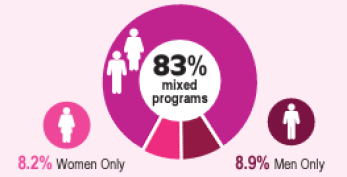

Applying interventions designed to reduce and manage the symptoms of substance use disorders.
Patients with alcohol misuse are less likely to receive preventive health services but more likely to utilize emergency health services. However, the association between alcohol misuse and outpatient follow-up after...
The Ministry of Narcotics Control (MNC) – Government of Pakistan in collaboration with the United Nations Office on Drugs and Crime (UNODC) organized a preparation workshop on the Universal Prevention Curriculum (UPC) on psychoactive and...
Findings amalgamated for the American Psychological Association indicate that patient progress is strongly related to the strength of the personal (‘real’) relationship between client and therapist - more strongly than the working...
Comprehensive review for the American Psychological Association concludes that the working relationship between clients and their counsellors or therapists is one of the largest and most consistent determinants of outcomes. Practice...
Findings amalgamated for the American Psychological Association show that across psychotherapy studies, outcomes improve the more therapists consistently demonstrate warmth and high regard for their clients - given the stigma and low regard...
Digital healthcare, also known as e-health, refers to tools and services that use information and communication technology to improve the prevention, diagnosis, treatment, monitoring and management of health.
Mobile health, or m-health...
Amalgamated research findings raise the intriguing possibility that experiencing the resolution of breakdowns or tensions (‘ruptures’) in the therapist-client relationship promotes client welfare even more than rupture-free relationships...
The Ninth EUSPR Conference and Members’ Meeting took place October 24th – 26th 2018, Lisbon, Portugal.
The focus of the event was Prevention Technologies – Improving the Use of Evidence in Prevention Practice.
Academics, researchers...
The Scottish Government has released the new Alcohol and Drugs Strategy, which aims to improve health by preventing and reducing alcohol and drug use, harm and related deaths. There were a record 934 drugs-related deaths in Scotland in 2017...
The European Monitoring Centre for Drugs and Drug Addiction have released their first report on the medical use of cannabis.
The report is part of a new series called Cannabis, Controversies and Challenges, and is designed to explore the...
The science of addiction is complicated, and it continues to be a field where the debate over definitions, models, theories, and the most appropriate ways to respond continues.
EMCDDA's Insight Review provides a critical analysis of the...
Many people successfully recover from substance use disorders. Understanding the factors that contribute towards people deciding to stop using substances can help guide treatment and design interventions.
A recent study has explored the...
Drinking alcohol is a risk factor contributing to seven types of cancer.
The more alcohol you drink, the greater the risk of developing cancer.
This fact sheet, developed by Alcohol Change UK, explains how high these risks are, which...
Alcohol Change UK have released a fact sheet highlighting the various ways alcohol can affect the health of your brain as well as changes you can make in order to take care of this vital organ.
Alcohol Change UK have released their latest report, which highlights the state of alcohol use in the UK and recommends changes that will reduce harm and promote a healthier society.
The report gives a clear overview of the cost and...
Adolescence is a period of time where young people are more likely to seek independence and novel experiences, experiment with their expression and identity and have less regard for risk. Given the natural surge in sensation-seeking...
Highlights
Th...
Highlights
The more therapists empathically communicate their understanding of and compassion for clients, the better the outcomes - a relationship stronger than between outcomes and the type of therapy. Recommendations in this review commissioned by...
The Journal of Addiction has published its latest podcast describing the highlights from the December issue of Addiction.
In addition to describing the key features that are presented in the journal, the podcast includes a selection of...
Share the Knowledge: ISSUP members can post in the Knowledge Share – Sign in or become a member